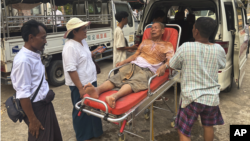The death toll of a 7.7-magnitude earthquake in Myanmar has climbed to more than 1,600 amid fears that the casualty figures will continue to rise in the war-torn nation and in neighboring Thailand.
Myanmar’s military-run government said on March 29 that 1,644 people were killed in the earthquake that rocked the region a day earlier, while authorities in Thailand said at least 10 people have been found dead so far.
The toll of those injured rose to 3,408, while the number of those missing increased to 139.
Rescue workers in Myanmar on March 29 continued to search for possible survivors in the rubble of collapsed buildings, and the country’s military leadership allowed hundreds of foreign rescue personnel to enter to assist in the effort.
The country’s junta government declared a state of emergency across six regions and its isolated leader, General Min Aung Hlaing, said earlier on state television that he had invited "any country" to provide help and donations.
Myanmar’s military government is locked in a fight with anti-junta insurgents, a situation that could hamper the rescue and relief operation.
A spokesman for the opposition National Unity Government said earlier that fighters from the anti-junta militias known as the People's Defense Forces would provide humanitarian help.
Historic City At Epicenter
According to the US Geological Survey, the earthquake occurred at around 1:30 p.m. local time at a depth of 10 kilometers near Mandalay, the second-largest city in Myanmar. It was followed 11 minutes later by a 6.4-magnitude aftershock.
The tremors left buildings, bridges, and roads wrecked in the epicenter, Mandalay, an ancient city of about 1.5 million people, residents and local media said.
Reuters cited an unnamed resident as saying that destruction stretched across the entire city, leaving it with no electricity and disrupted phone lines.
Thailand’s capital, Bangkok -- located more than 600 miles from the epicenter -- was declared a disaster zone after the quake sent high-rise buildings swaying.
Thailand's deputy prime minister, Anutin Charnvirakul, said authorities had mobilized all possible resources in the search for survivors and to retrieve the remains of the deceased.
"We always have hope," Charnvirakul told reporters. "We're still working around the clock."
Thailand's state-owned operator of the country's airports said in a statement on March 29 that operations at six airports -- including in Bangkok and Phuket -- had returned to normal operations and safety inspections.










